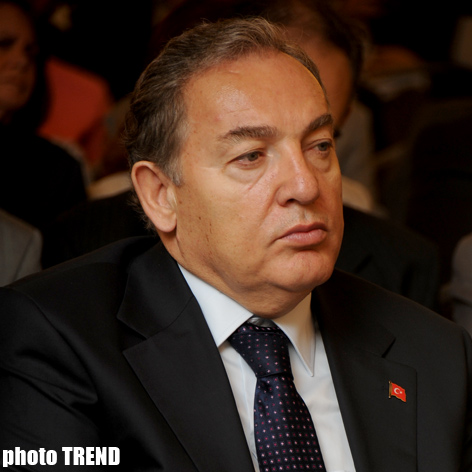Azerbaijan, Baku, Oct. 25 / Trend R.Hafizoglu /
Turkish Ambassador to Azerbaijan Hulusi Kilic believes a settlement of the Nagorno-Karabakh conflict is one of the important conditions for the permanent peace in the South Caucasus.
"A settlement of the Nagorno-Karabakh conflict is one of the important conditions for the establishment of durable peace in the South Caucasus," Kilic said. "Normalization policy that Turkey pursues towards Armenia should be regarded as part of steps taken to achieve a long-standing peace and stability in the South Caucasus."
Turkish and Armenian foreign ministers Ahmet Davutoglu and Edward Nalbandian signed the Ankara-Yerevan protocols in Zurich Oct. 10.
Turkey and Armenia in the talks mediated by Switzerland have reached an agreement to launch "internal political consultations" on Aug. 31 to sign the "Protocol on the Establishment of Diplomatic Relations and Protocol on the Development of Bilateral Relations," the Turkish Foreign Ministry reported.
Following his official visit to Moscow, Turkish Prime Minister Recep Tayyip Erdogan said although some say the Turkish-Armenian relations are apart from the Nagorno-Karabakh conflict, the normalization process is directly related to the settlement of the Nagorno-Karabakh conflict.
The Armenian Constitutional Court considered the commitments reflected in the Turkish-Armenian protocols on Jan.12, 2009.
After approving the protocols, the court said that there is no need to form a joint commission to investigate the events of 1915. Armenia will never refuse its claims of "genocide," the court said.
Armenian President Serzh Sargsyan signed a decree to suspend the ratification of "Protocol on establishment of diplomatic relations" and "Protocol on development of bilateral relations" signed in Zurich October 10, 2009. Armenian Foreign Minister was charged to inform Turkey on suspension of the ratification of the protocols in accordance with the presidential decree.
Kilic believes the process of normalization of the Turkey-Armenia relations will positively improve a settlement of the Nagorno-Karabakh conflict and give impetus to the efforts taken in this direction.
"The settlement of the conflict situation in the South Caucasus and its turning into a region of stability and cooperation is important for the future of the region's all countries and its well-being. It will benefit the regional countries. Otherwise, steps taken to normalize the situation in the region will not be durable," Kilic added.
Kilic said Turkey has not changed its position on settlement of the Nagorno-Karabakh problem.
"I can say that we agree with Azerbaijan on this issue," he said.
The conflict between the two South Caucasus countries began in 1988 when Armenia made territorial claims against Azerbaijan. Armenian armed forces have occupied 20 percent of Azerbaijan since 1992, including the Nagorno-Karabakh region and 7 surrounding districts.
Azerbaijan and Armenia signed a ceasefire agreement in 1994. The co-chairs of the OSCE Minsk Group - Russia, France, and the U.S. - are currently holding the peace negotiations.
Armenia has not yet implemented the U.N. Security Council's four resolutions on the liberation of the Nagorno-Karabakh and the surrounding regions.
Do you have any feedback? Contact our journalist at [email protected]






